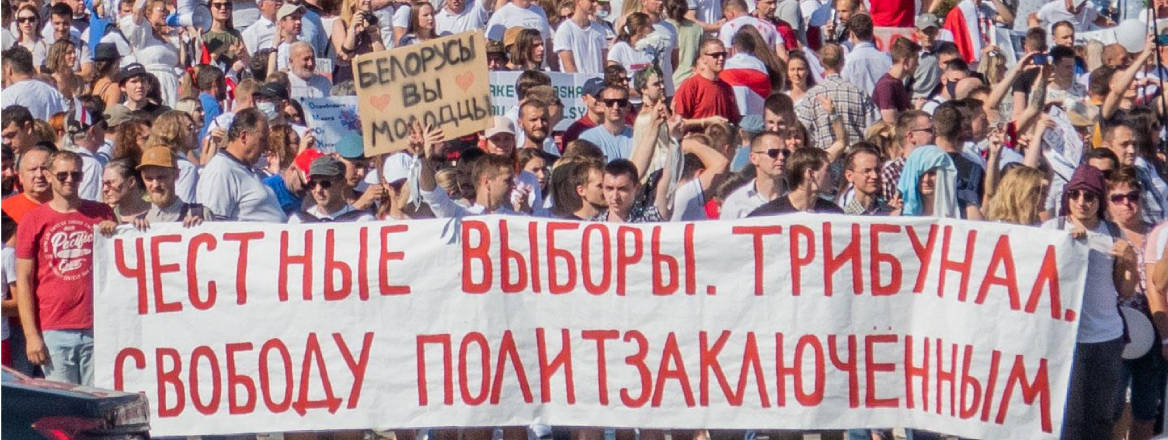No Country for Strong Men: What Next for Belarus?
Unprecedented protests leave Belarus irrevocably changed and civil society awakened. While events are not geopolitical in origin, this domestic upheaval will have long-term international implications.
This year saw Europe’s most authoritarian ruler grossly and repeatedly miscalculate. As he, like other autocrats, downplayed the pandemic, Belarusian leader Alexander Lukashenko exacerbated long-held frustrations about the country’s political system and stagnating economy. Events culminated in an election campaign that saw overwhelming support for his opponent, Svyatlana Tsikhanouskaya, and patently falsified election results. Since then, Lukashenko’s regime has faced unprecedented pressure from street protests and striking workers. Belarus and its role in Eastern Europe have irreversibly changed.
As Lukashenko violently cracked down on protestors after the 9 August elections, he shattered the population’s prevalent, albeit unenthusiastic, appreciation for the country’s stability. Instead, a genuine civil society has emerged and there has been a massive resurgence in national identity in Belarus. The Belarusian language, while still spoken by only one in four in their everyday life, is gaining in popularity. The historic red-and-white flag instead of the official Soviet-rooted red-and-green variety flutters outside apartment buildings and is wrapped around shoulders.
The appearance of these symbols is indicative of an unprecedented, almost instantaneous politicisation of society. For months, people have been turning to online media and messenger services, particularly Telegram, for information, as distrust in state media grew. After the elections, a new, all-encompassing opposition including many former Lukashenko supporters has taken to the streets – largely peacefully, despite police brutality. Workers in state-owned factories and a number of Belarusian state-media journalists have initiated strikes.
However, Lukashenko has refused to accept the extent to which he has lost domestic support. Even if he manages to stay in office, either by quelling dissent using increased repression or – to everyone’s surprise – allowing some national unity government, there is no return to the status quo ante.
Crucially, the politicisation and strengthening of national consciousness in Belarus are not related to the country’s international position. Since 2014, Belarus has maintained a close alignment with Russia but flirted with the West – much to Moscow’s displeasure. Increasingly, Lukashenko also put his hopes on cooperation with China. However, demands in the election campaign and subsequent protests do not reference a choice between a Russian-led Eurasia or Europe, as many political campaigns in Eastern Europe have been rightly or falsely framed.
Lukashenko actually wants observers to believe that the upheaval is akin to Ukraine’s Maidan protests, hoping to receive Russian support. Citing potential ‘NATO threats’, the Belarusian army is mobilising, including conscripts. Despite NATO’s denial of a military build-up, Belarus is becoming more impetuous towards western neighbours, most recently violating Lithuanian airspace in pursuit of balloons with anti-state symbols. The US and European states, including the UK, have so far condemned state violence, announced targeted sanctions, and declared their willingness tacitly to support civil society and free media.
Having said that, current developments are already likely to have a number of implications for international politics in the long run. A future regime under Lukashenko may only survive at the cost of major concessions to Russia, through an ever-closer Union State. Today’s considerable dependence on Russia and its economy will persist without fundamental reform of the Belarusian state-run economy. The Kremlin, meanwhile, has little desire to bet on a potentially dead horse as Lukashenko is losing support, and is more likely planning ahead to see which probable presidential candidate or member of the elite will keep Belarus in Russia’s orbit. It has a number of tools at its disposal to influence decisions in Minsk, such as the media, business ties, loans or subsidised energy.
The popular uprisings still have considerable momentum and may well lead to Tsikhanouskaya’s Coordination Council shaping Belarusian political transition and the organising of new elections – even though the recent arrest of two leading members of the Council demonstrates that the current regime is not yet interested in pursuing a dialogue. Any immediate transitional leadership after Lukashenko would likely still incorporate many elements of the current regime and pursue amicable relations with the West while maintaining friendly ties with Russia. Already, Putin’s Press Secretary, Dmitry Peskov, stated that the Kremlin welcomed the news that the Coordination Council is not considering cutting ties with Russia.
Overall, Belarus’s delicate foreign policy balancing will almost certainly be maintained. The current elite, the opposition and the vast majority of Belarusians all have an interest in maintaining good relations with foreign actors, both in the east and west. This new Belarusian civil society is united in one strong desire, after all: to take matters into its own hands and not have its fate dictated by an autocrat or foreign powers.
Alexandra St John Murphy, a Research Fellow of the Minsk Dialogue Initiative, has lived in Minsk for three years and is on the ground now among very few international observers of the violent crackdowns.
Benno Zogg, a Senior Researcher at the Center for Security Studies at ETH Zurich, is a member of Minsk Dialogue’s Council of Experts and focuses on the international politics of Eurasia.
The views expressed in this Commentary are the authors, and do not represent those of RUSI or any other institution.

